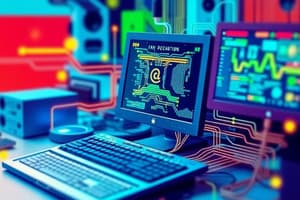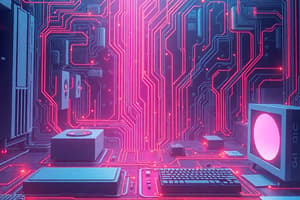Podcast
Questions and Answers
What is a feature of third generation computers?
What is a feature of third generation computers?
- Were very large in size
- Consumed lesser electricity (correct)
- Used mechanical calculators
- Used vacuum tubes
What was used in fourth generation computers?
What was used in fourth generation computers?
- Transistors
- Mechanical calculators
- Vacuum tubes
- VLSI technology (correct)
Which of the following is NOT a feature of third generation computers?
Which of the following is NOT a feature of third generation computers?
- Were very large in size (correct)
- Were more reliable
- Generated less heat
- Used IC
What was introduced in fourth generation computers?
What was introduced in fourth generation computers?
What is a programming language used in third generation computers?
What is a programming language used in third generation computers?
What is a feature of fourth generation computers?
What is a feature of fourth generation computers?
Which of the following is a third generation computer?
Which of the following is a third generation computer?
What is a feature of third generation computers?
What is a feature of third generation computers?
What is the typical use of a megabyte?
What is the typical use of a megabyte?
How many megabytes are in a gigabyte?
How many megabytes are in a gigabyte?
What is the main function of BIOS?
What is the main function of BIOS?
Where is BIOS typically stored?
Where is BIOS typically stored?
What is a terabyte commonly used for?
What is a terabyte commonly used for?
How many gigabytes are in a terabyte?
How many gigabytes are in a terabyte?
What type of software is BIOS?
What type of software is BIOS?
When is BIOS activated?
When is BIOS activated?
What is the primary function of a projector?
What is the primary function of a projector?
What is the main advantage of a printer?
What is the main advantage of a printer?
What type of printer is known for its impact printing mechanism?
What type of printer is known for its impact printing mechanism?
What is a characteristic of a Daisy Wheel printer?
What is a characteristic of a Daisy Wheel printer?
What is the function of the hammer in a Daisy Wheel printer?
What is the function of the hammer in a Daisy Wheel printer?
What is the primary use of a projector?
What is the primary use of a projector?
What is a common use of printers?
What is a common use of printers?
What is the name of the printer that uses a wheel with spokes to print characters?
What is the name of the printer that uses a wheel with spokes to print characters?
What was DVD primarily used for?
What was DVD primarily used for?
What is a port in a computer?
What is a port in a computer?
What was the primary use of PS/2 port?
What was the primary use of PS/2 port?
What is the speed of data transfer in USB port?
What is the speed of data transfer in USB port?
What connects a monitor to a computer's video card?
What connects a monitor to a computer's video card?
What type of plug is used to connect a computer's power cable?
What type of plug is used to connect a computer's power cable?
What is the primary use of Firewire port?
What is the primary use of Firewire port?
What is the primary use of Modem port?
What is the primary use of Modem port?
What is the primary function of an Operating System?
What is the primary function of an Operating System?
Which of the following is an objective of an Operating System?
Which of the following is an objective of an Operating System?
What is a characteristic feature of an Operating System?
What is a characteristic feature of an Operating System?
What does an Operating System manage?
What does an Operating System manage?
What is the role of an Operating System in managing resources?
What is the role of an Operating System in managing resources?
What is the purpose of an Operating System in managing processor resources?
What is the purpose of an Operating System in managing processor resources?
What is an Operating System responsible for in terms of memory management?
What is an Operating System responsible for in terms of memory management?
What is the purpose of an Operating System in providing efficient and fair sharing of resources?
What is the purpose of an Operating System in providing efficient and fair sharing of resources?
Flashcards are hidden until you start studying
Study Notes
Third Generation Computers (1964-1971)
- Used remote processing, time-sharing, and multi-programming operating systems
- Featured high-level programming languages such as FORTRAN-II TO IV, COBOL, PASCAL PL/1, and ALGOL-68
- Characteristics:
- Integrated circuits (IC) used
- More reliable compared to previous generations
- Smaller in size
- Generated less heat
- Faster
- Required lesser maintenance
- Costly
- Required AC
- Consumed lesser electricity
- Supported high-level languages
- Examples of third generation computers: IBM-360 series, Honeywell-6000 series, PDP (Personal Data Processor), IBM-370/168, and TDC-316
Fourth Generation Computers (1971-1980)
- Used Very Large Scale Integrated (VLSI) circuits
- Featured real-time, time-sharing, and distributed operating systems
- Characterized by:
- VLSI technology used
- Very cheap
- Portable and reliable
- Use of personal computers
- Very small size
- Pipeline processing
- No AC required
- Concept of internet was introduced
- Great developments in networks
- Computers became easily available
- Examples of fourth generation computers: DEC 10, STAR 1000, PDP 11, CRAY-1 (Super Computer)
Output Devices
Projector
- Projects output onto a screen using light and lenses
- Ideal for presentations or teaching large groups
Printer
- Produces hard copies of processed data
- Enables users to print images, text, or other information onto paper
- Types of printers:
- Daisy Wheel Printer
- Dot Matrix Printer
Daisy Wheel Printer
- Invented by David S. Lee at Diablo Data Systems
- Features a wheel or disk with spokes or extensions resembling a daisy
- Has molded metal characters at the end of extensions
- Prints characters by rotating the wheel and striking the ink ribbon against the paper
- Cannot print graphics, slow, and noisy, hence obsolete
Dot Matrix Printer
- An impact printer that prints characters and images using patterns of dots
- Uses a print head with pins to produce dots on paper
- Widely used for storing and viewing movies and distributing software programs
- Also known for its ability to store large files and programs
Ports
PS/2 Port
- Used for old computer keyboards and mice
- Also known as the mouse port
- Typically found on older computers, with two PS/2 ports each for the mouse and keyboard
Universal Serial Bus (USB) Port
- Can connect various external USB devices such as hard drives, printers, scanners, mice, and keyboards
- Introduced in 1997
- Minimum of two USB ports found on most computers
- Data travels at 12 megabits per second
- USB compliant devices can draw power from the USB port
VGA Port
- Connects a monitor to a computer's video card
- Has 15 holes, similar to a serial port connector but with holes instead of pins
Power Connector
- A three-pronged plug that connects to the computer's power cable and a power bar or wall socket
Firewire Port
- Transfers large amounts of data at high speeds
- Connects camcorders and video equipment to computers
- Data travels at 400 to 800 megabits per second
- Invented by Apple
- Has three variants: 4-Pin FireWire 400 connector, 6-Pin FireWire 400 connector, and 9-Pin FireWire 800 connector
Modem Port
- Connects a PC's modem to the telephone network
Data Measurement Units
Megabyte
- A unit of measurement for data storage
- Frequently used to calculate the size of documents, software packages, and media files
- Still an important and commonly used unit of measurement
Gigabyte
- Contains 1024 megabytes
- Has a considerable data storage capacity
- Often used to measure the storage capacity of hard drives, solid-state drives, and other data storage devices
- Commonly used to describe the size of multimedia files and the demand for large amounts of storage
Terabyte
- Contains 1024 gigabytes
- Represents a huge data storage capacity
- Often used in large databases, video collections, and enterprise-level storage systems
- Becoming increasingly significant due to the growing need for large-scale data processing and storage
BIOS
- Stands for Basic Input Output System
- A type of system software stored in Read-Only Memory (ROM) on the motherboard or flash memory in advanced systems
- The first software to activate when a computer is turned on
Operating System
Introduction
- Acts as an interface between software and computer hardware
- An integrated set of specialized programs used to manage overall resources and operations of a computer
- Controls and monitors the execution of all other programs that reside in the computer
Objectives of Operating System
- Make the computer system convenient to use in an efficient manner
- Hide hardware resource details from users
- Provide users with a convenient interface to use the computer system
- Act as an intermediary between the hardware and its users
- Manage resources of a computer system
- Keep track of who is using which resource, granting resource requests, and mediating conflicting requests from different programs and users
- Provide efficient and fair sharing of resources among users and programs
Functions of Operating System
- Memory Management: keeps track of primary memory usage and allocates memory to programs
- Processor Management: allocates the processor (CPU) to a process and deallocates when no longer required
Studying That Suits You
Use AI to generate personalized quizzes and flashcards to suit your learning preferences.



